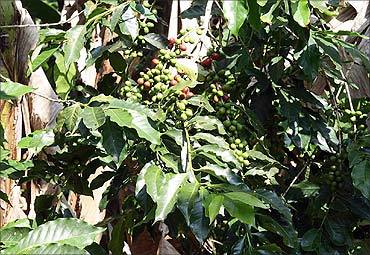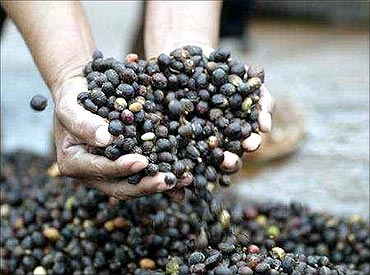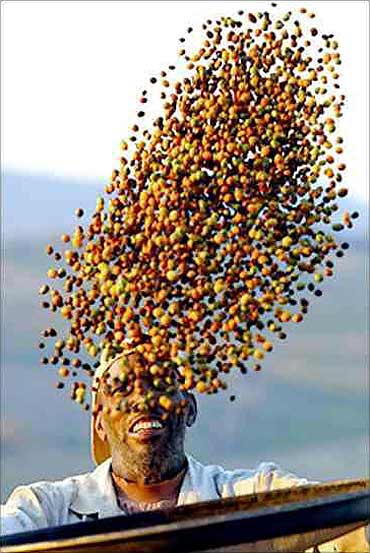Photographs: Reuters Shubhashis Gangopadhyay
Coffee growers in Orissa have demanded that subsidies for the expansion of coffee plantations in areas that have traditionally not grown coffee should be the same as those given for such expansion in traditional areas.
In other words, their grouse is that, being non-traditional growers, the subsidies they get from the Coffee Board is a lot less than what the Board gives to traditional growers.
In particular, the association of coffee growers in Orissa are demanding that the subsidy for bringing new areas under coffee should cover 50 per cent of the costs of doing so with a cap of Rs. 1.75 lakh per hectare.
Currently, the subsidy they get is 25 per cent of the cost with a cap of Rs. 60,000 per hectare on plantation project cost.
They make two points to support their claims: (a) the current subsidy figures are based on calculations made in 1992 and so, need to be revised upwards as costs have gone up since then and (b) the non-traditional area growers receive less than the traditional area growers and that, they claim is unfair.
Let us consider the arguments one by one.
In 2011, people are arguing that the subsidies being given for the last 20 years need to be revised upwards.
...
Orissa coffee growers demand subsidy
Image: Subsidy to non-traditional growers does not make sense.Photographs: Reuters
The obvious question is why is it important to increase coffee production in non-traditional areas? Is coffee a strategic crop that India needs to produce and, hence, one should not look at its own economic profitability?
Are there wider consequences for national security or, for the profitability of other activities? Or, may be, is it a public good and considerations of private profitability alone will lead to under-investment in this activity and that is inefficient.
The reason why I am speculating along such lines is because, for the life of me, I am unable to get the argument.
When I start thinking about it, I am invariably led to the following inescapable inference: if a subsidy that has continued for 20 years leads one to the conclusion that more is needed for a further unidentified length of time, and at a greater scale, then probably it is better to scrap the subsidy altogether.
Unless of course, we can find some other non-commercial reason for growing more coffee in non-traditional areas.
...
Orissa coffee growers demand subsidy
Image: Commercial feasibility most important factor.Photographs: Reuters
And then, any reduction or stoppage of the subsidy will mean loss of livelihood of these workers and, hence, we can argue that subsidies should continue in perpetuity.
Moreover, by then the number of people whose livelihoods will be at stake would have increased many fold due to the growth of coffee in non-traditional areas.
It is wonderful that the Coffee Board has identified more areas where coffee can be grown.
However, I presume that it is not only the technological feasibility - soil and weather, for instance - but also the commercial feasibility that should be considered.
If after continuous subsidisation for 20 years, one clamours for more, there has to be something seriously wrong with the process of such identification.
I can just imagine what could be done with the Rs. 1.75 lakh per hectare amount by the children of the would-be coffee plantation workers.
May be they can get some education and training and end up working for Infosys! Perhaps, I am being silly.
...
Orissa coffee growers demand subsidy
Image: Coffee drinkers will subsidy coffee growers.Photographs: Reuters
One would think that the traditional areas had some specific advantages to growing coffee and, hence, their legacy.
Of course, it could be pure luck that they started growing coffee before the growers in non-traditional areas.
But now that they know that such opportunities exist for them too, the non-traditional growers should seize the moment and start making profits.
Indeed, that is what they are trying to impress upon the government and the Board.
Well, because they have understood the real way to make profits - through subsidies!
And, hence they demand equity; if the government allows some groups to benefit from government's largesse, then why not everyone in a rule of law, democratic society.
Once again, I wonder. Coffee growers will be transferred money by the government but that money does not belong to the government or the coffee growers. It belongs to the non-coffee growers and, of course, the coffee drinkers.
...
Orissa coffee growers demand subsidy
Image: Government should explain subsidy.Photographs: Reuters
For example, should they not spell out exactly why they need the subsidy and how it will help the non-coffee growers to encourage them to give up their money?
Is it not the responsibility of the government that gives subsidies and the takers of these subsidies to explain to those whose money is being taken how the subsidy is helping any one (other than the takers)?
Every time someone questions any subsidy, those who receive and bleeding hearts fill the air with cries of "loss of livelihood" and "down with markets".
The only problem is that this has been the pattern ever since Independence and 1991 notwithstanding.
However, livelihood issues are not any less significant than before and our only effort at addressing that seems to be concentrated on conjuring up newer and newer ways to subsidise.
The author is Research Director at IDF








article